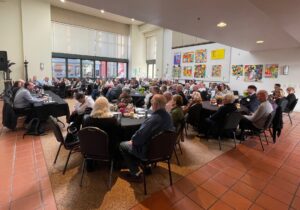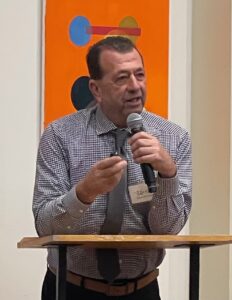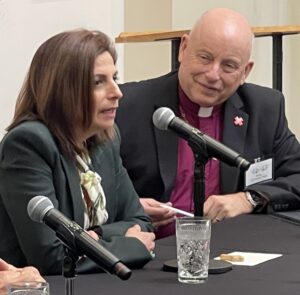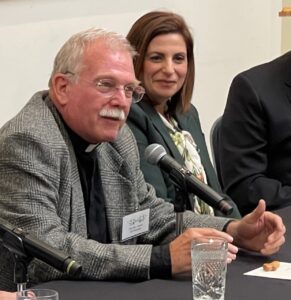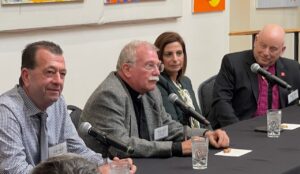
(From left) Canon Iyad Qumri, the Rev. Canon Bill Schwartz, Joumana Silyan-Saba, and Bishop John Harvey Taylor at the panel discussion March 9. Photo by Bob Williams
Video of the panel discussion, keynote address, available on the diocesan YouTube.
Los Angeles Bishop John Harvey Taylor welcomed 85 sojourners to St. Paul’s Commons, Echo Park, March 9 for a Holy Land virtual pilgrimage, dinner, and panel discussion titled “Christians in Iraq, Palestine and Syria: A Contemporary Perspective,” featuring Canon Iyad Qumri and others who urged Western support of Middle Eastern Christians.
Taylor, who facilitated the discussion, said the Oct. 7, 2023, Hamas attack on Israeli citizens and subsequent Gaza war, “drove a wedge into interfaith relationships everywhere, especially in our community,” but hoped such conversations could help to repair ties.
Unfortunately, the longstanding Israeli-Palestinian conflict “is going from bad to worse,” said Qumri, who in January 2025 guided 10 bishops from The Episcopal Church on a Holy Land visit through Qumri Pilgrimages, which he founded about 30 years ago. Taylor was scheduled to take part in that trip but postponed it because of the Los Angeles wildfires.
Qumri, a Palestinian Christian from East Jerusalem, has guided thousands of others, from The Episcopal Church, and from Los Angeles, the U.S. and elsewhere to help them understand the region without taking sides, he said. “It’s more, how can we make this work,” Qumri said.
Other panelists offering personal insights were Joumana Silyan-Saba and the Rev. Canon Bill Schwartz. Silyan-Saba is director of Civic Engagement and Human Rights for the city of Los Angeles, and at age 15 moved with her family from Aleppo, Syria, to the United States. Schwartz is a board member of Stand with Iraqi Christians, and offered perspectives about the Iraqi Christian community. He is the retired archdeacon of the Anglican Diocese of Cyprus and the Gulf, and dean of St. Christopher’s Cathedral, Manama, Bahrain. He currently serves at Christ the King Church in Alpine, California.
Holding honest conversations brings a renewed hope for peace and for change, despite ongoing regional political instability, persecution and governmental occupation, which have prompted an ongoing exodus of Christians, speakers said.
Palestine: an ongoing Christian exodus
Military occupation, government constraints and checkpoints have further prompted the exodus of Christian Palestinians from the Holy Land, who often are hampered from even showing up for work in Jerusalem, Qumri said. The percentage of Christians in Bethlehem, the birthplace of the faith, for example, has plummeted from around 90% of the total population in the 1920s to about 2% currently, he said.
While both Palestinian Christians and Muslims long for a better future, “what kind of future are you going to have if you live within walls or barriers or fences?” Qumri asked.
Worldwide media attention has focused on the horror of the Hamas attack, yet little has been said about ongoing inequities, and Palestinian suffering. “Do you really need tanks and drones to destroy a half-mile refugee camp?” he said, referring to the Israeli Forces’ large scale operation against the Jenin Palestine refugee camp, which began Jan. 25 and continues.
“I don’t understand it,” continued Qumri. “Many times, I say, where is the world? Why is nobody talking about this? Why does no one stand with us?” There is no justification for the terrible Hamas Oct. 7 attack, he added, “but what about the terrible things they (the Israeli government) are doing?” including the destruction of and the killing of an estimated 60,000 Palestinians in Gaza.
There are some 900 checkpoints in and around the area. Earlier that day, Qumri’s wife, Simone, had visited the couple’s home in Jericho. “She was excited, because there was no checkpoint,” he said. “Can you imagine?”
Still, visitors are safe, said Qumri, who encouraged pilgrimages and offered a virtual presentation of what pilgrims might expect during a Holy Land visit. He invited the diocesan community to consider resuming pilgrimages. His friendships with prior pilgrims span the Diocese of Los Angeles, of which he was named an honorary canon by Bishop J. Jon Bruno in 2008.
Qumri also mentioned “No Other Land,” by a Palestinian-Israeli collective, about activists fighting Israeli demolitions of Palestinian homes in the occupied West Bank, won the 2025 Academy Award for best documentary. It also highlights the friendship between the Palestinian and Israeli filmmakers, who addressed each other as “brothers” when accepting the award. “It gave me goose bumps,” Qumri said. “I thought, we need more of this. And already, I am told, there are challenges about who’s going to distribute the movie.”
Syria’s transitions: hope, democracy, sectarian violence
Religious and national identity in Syria, among the oldest Christian communities in the world, dating to the first century A.D., is closely intertwined with the land, according to Silyan-Saba, a Syrian Christian and conflict resolution specialist who has trained U.S. diplomats and, in 2015, briefed then Vice President Joe Biden.
“Today, Syria is facing tremendous challenges on all fronts,” including political instability and sectarian violence as the country transitions from the Assad dictatorship to a democracy. “For me, when we speak about democracy, it is holy,” she said. “It is holy because I know what it’s like to live in an authoritarian regime. I grew up as a child being told not to speak, not to speak in public, not to speak on the phone,” she said.
Historic as well as recent challenges have led to an exodus of Christians, including her family, said Silyan-Saba, whose father is Armenian. “I think the number of Syrian Christians remaining in the region is about 2%, a very tiny minority at the moment, compared to about 10% roughly ten years ago,” she said. In addition to Christians, the country is home to other minority groups, “including Jews, Yazidis and Kurds and even within the Muslim umbrella, there are different sects,” she said.
While many had hoped overthrow of the Bashar al-Assad dictatorship in 2024, would end violence, it has continued with at least a thousand killed in recent weeks, she said.
Honest and open conversations, along with interfaith collaborative efforts led to the November 2024 passage of the Human Securities Resolution by the Los Angeles City Council, reaffirming and strengthening the city’s commitment to the fundamental rights of freedom of speech, of worship and of fear from want for everyone, she said.
“It didn’t come easily,” she added. “It took a couple of years to get to that point. If we can have these conversations and truly dig deeply into where things are and why they are as they are today, then we can collectively find a way to help each other forward and out of the unfortunate realities that the Middle East continues to experience, both socially and politically,” she said. “The point of hope is, how do we transition? How do we move forward from the chaos, the conflict?”
Anti-Semitism, Islamophobia, and the persecution of Christians “are real,” she added. “That is where working with people like Bishop Taylor and so many of our other faith leaders is helpful. They’re the ones doing the heavy lifting.”
Such engagement, “gives me a sense that I am not standing idly by, but rather doing something that is going to, at the very least, allow us to remove these sorts of labels we have constantly placed on each other,” she added. “And, once we’re able to do that, it’s a different conversation.”
Otherwise, she said, “What happens to Christianity in the West? Because Christians in the Middle East are not only drowning, but they are also being erased, as an identity, as a people.”
Iraq: creating a future
Schwartz said the Christian church, “began in Iraq, the same way it began in the Book of Acts. The apostles went east as well as west.” Today, Christianity in Iraq encompasses both the Assyrian Orthodox and the Chaldean Catholic churches, which prospered under Saddam Hussein but have struggled since the former dictator’s ousting in 2003, after the U.S.-led invasion of that country.
With the formation of ISIS and other regional instability, Christians have found life difficult, dwindling from about 1.4 million pre-2003 to about 250,000 today, who “have no sense of where the future is for them and their children,” he said.
“These are hard-core Iraqi Christians,” he added. “They’re not leaving. This is their land.” As the country continues to rebuild and to recover from political instability, Stand With Iraqi Christians, assists by offering small business loans and other economic development opportunities, he said.
“Christians have always been educated professionals, the engineers, doctors. The image in the media is, that there’s a lot of fighting, there’s a lot of disruption. The economy is a mess; there is corruption. But the people who live on the ground, understand that they need each other, and there is hope for those who want to work. So where is the future of the church in Iraq? In the people.”
He added: “they desperately need help from the rest of the world, and they’re looking for help from the United States, because many of them blame the U.S. for their economic problems. Think about praying for the people, not just the Christians there, but everyone. What we need to pray for is stability.”
Family Ties

